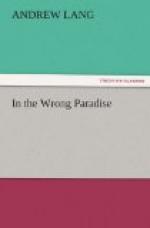There is, to be sure, one priestly ghost-story, which you may or may not know, and I tell it here, though I don’t believe it, just as I heard it from the Bishop of Dunchester himself. According to this most affable and distinguished prelate, now no more, he once arrived in a large country house shortly before dinner-time; he was led to his chamber, he dressed, and went downstairs. Not knowing the plan of the house, he found his way into the library, a chamber lined with the books of many studious generations. Here the learned bishop remained for a few minutes, when the gong sounded for dinner, and a domestic, entering the apartment showed the prelate the way to the drawing-room, where the other guests were now assembled. The bishop, when the company appeared complete, and was beginning to manoeuvre towards the dining-room, addressed his host (whom we shall call Lord Birkenhead), and observed that the ecclesiastic had not yet appeared.
“What ecclesiastic?” asked his lordship.
“The priest,” replied the bishop, “whom I met in the library.”
Upon this Lord Birkenhead’s countenance changed somewhat, and, with a casual remark, he put the question by. After dinner, when the ladies had left the men to their wine, Lord Birkenhead showed some curiosity as to “the ecclesiastic,” and learned that he had seemed somewhat shy and stiff, yet had the air of a man just about to enter into conversation.
“At that moment,” said the bishop, “I was summoned to the drawing-room, and did not at first notice that my friend the priest had not followed me. He had an interesting and careworn face,” added the bishop.
“You have certainly seen the family ghost,” said Lord Birkenhead; “he only haunts the library, where, as you may imagine, his retirement is but seldom disturbed.” And, indeed, the habits of the great, in England, are not studious, as a rule.
“Then I must return, Lord Birkenhead, to your library,” said the bishop, “and that without delay, for this appears to be a matter in which the services of one of the higher clergy, however unworthy, may prove of incalculable benefit.”
“If I could only hope,” answered Lord Birkenhead (who was a Catholic) with a deep sigh, “that his reverence would recognize Anglican orders!”
The bishop was now, as may be fancied, on his mettle, and without further parley, retired to the library. The rest of the men awaited his return, and beguiled the moments of expectation with princely havannas.
In about half an hour the bishop reappeared, and a close observer might have detected a shade of paleness on his apostolic features, yet his face was radiant like that of a good man who has performed a good action. Being implored to relieve the anxiety of the company, the worthy prelate spoke as follows:




